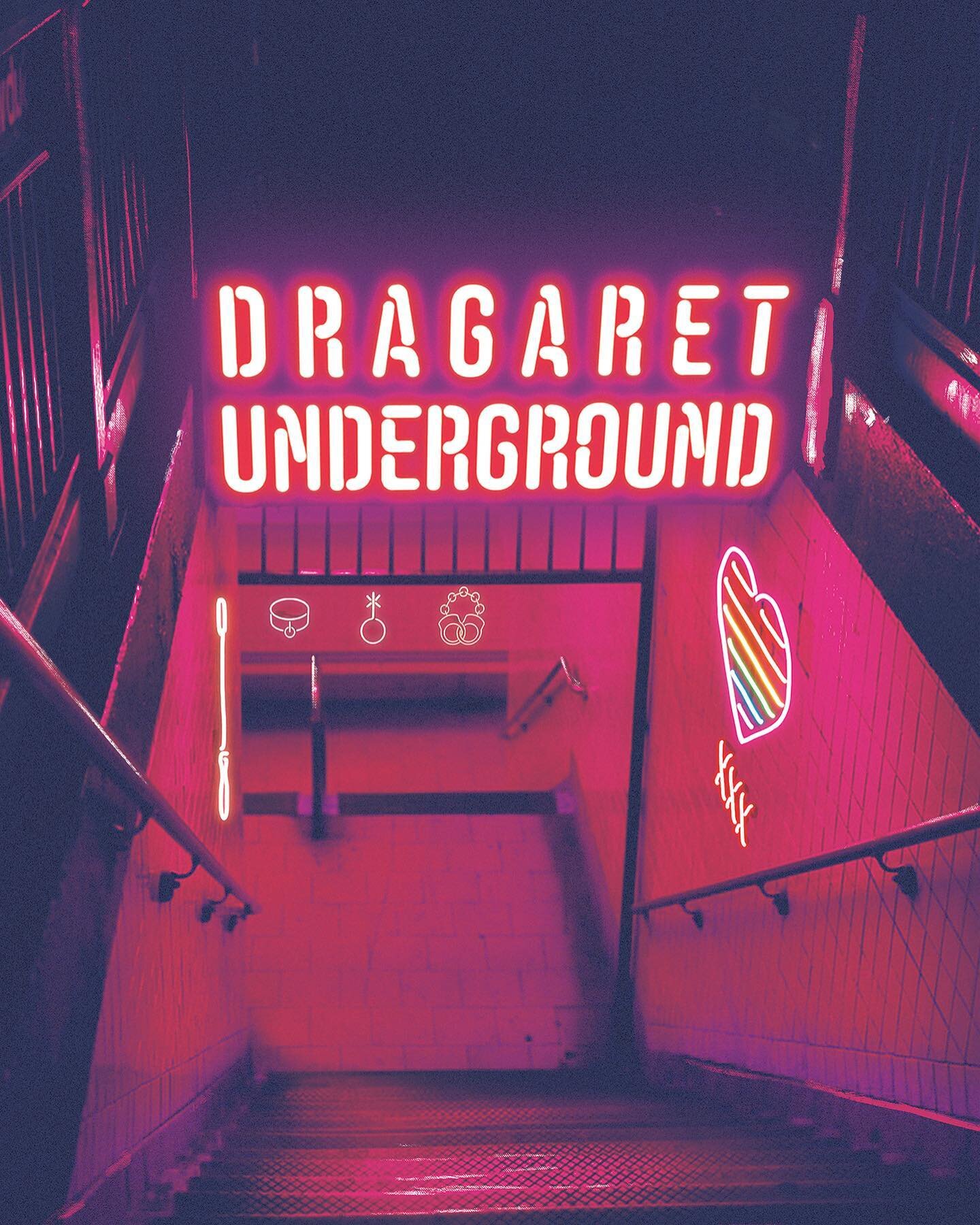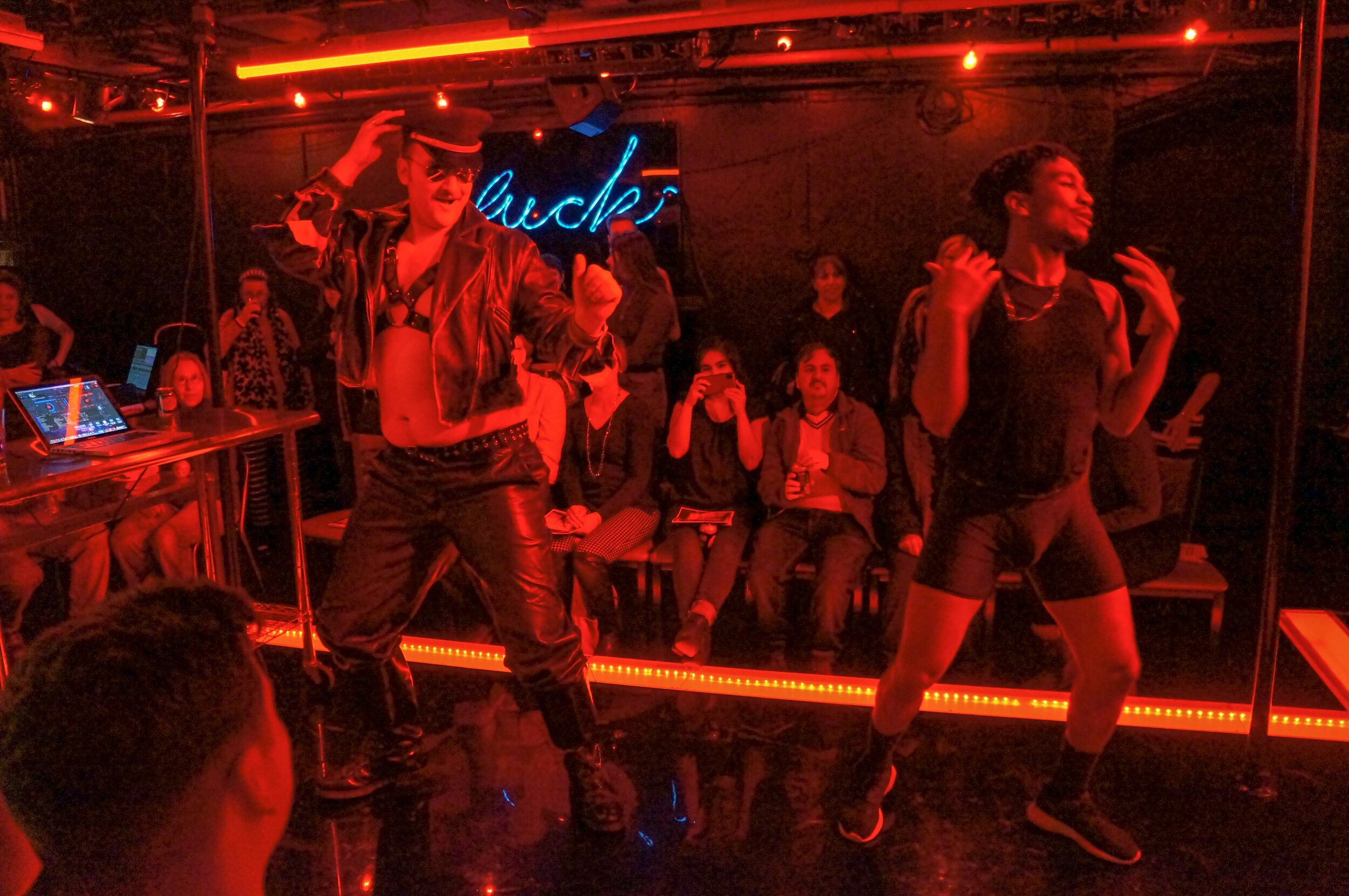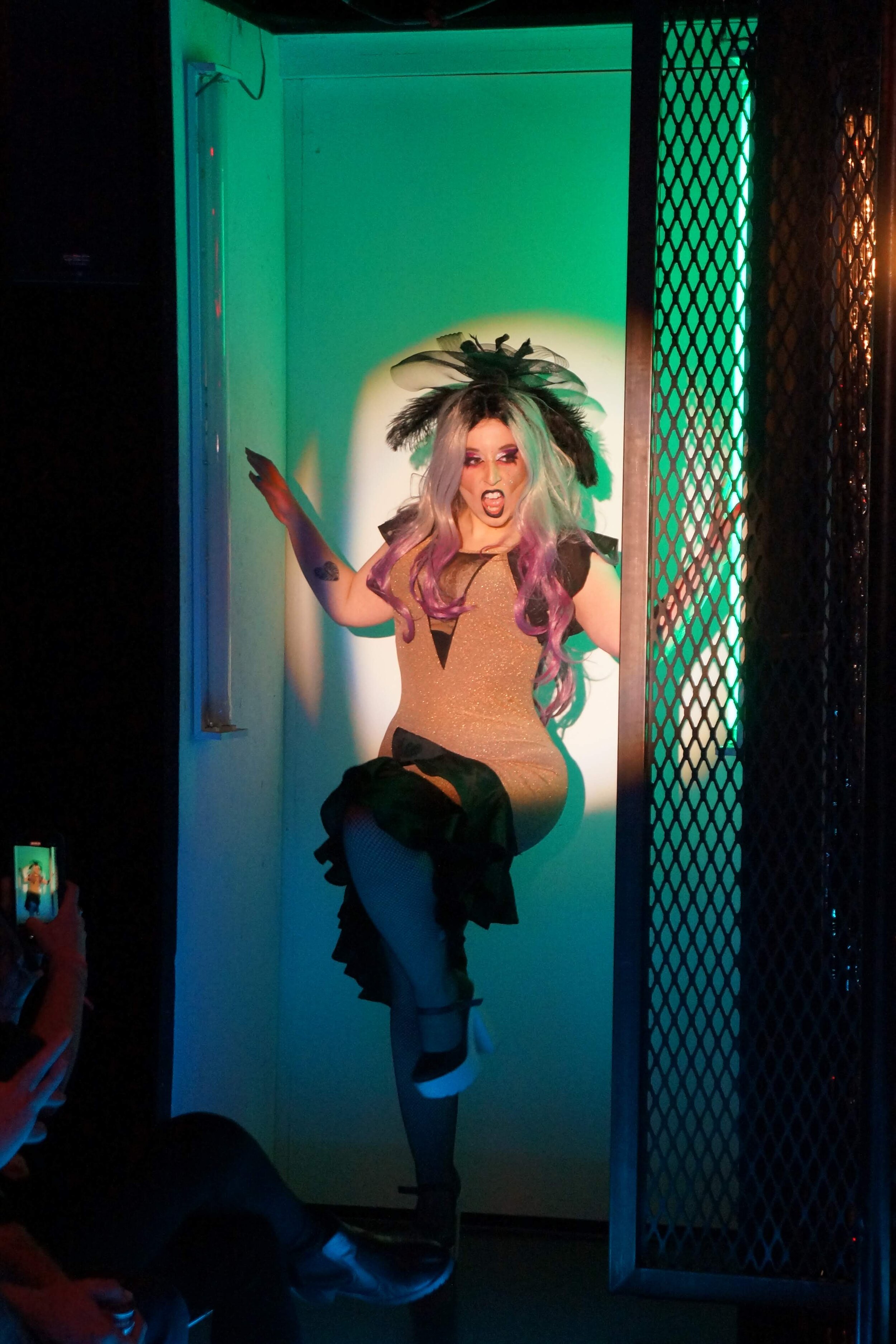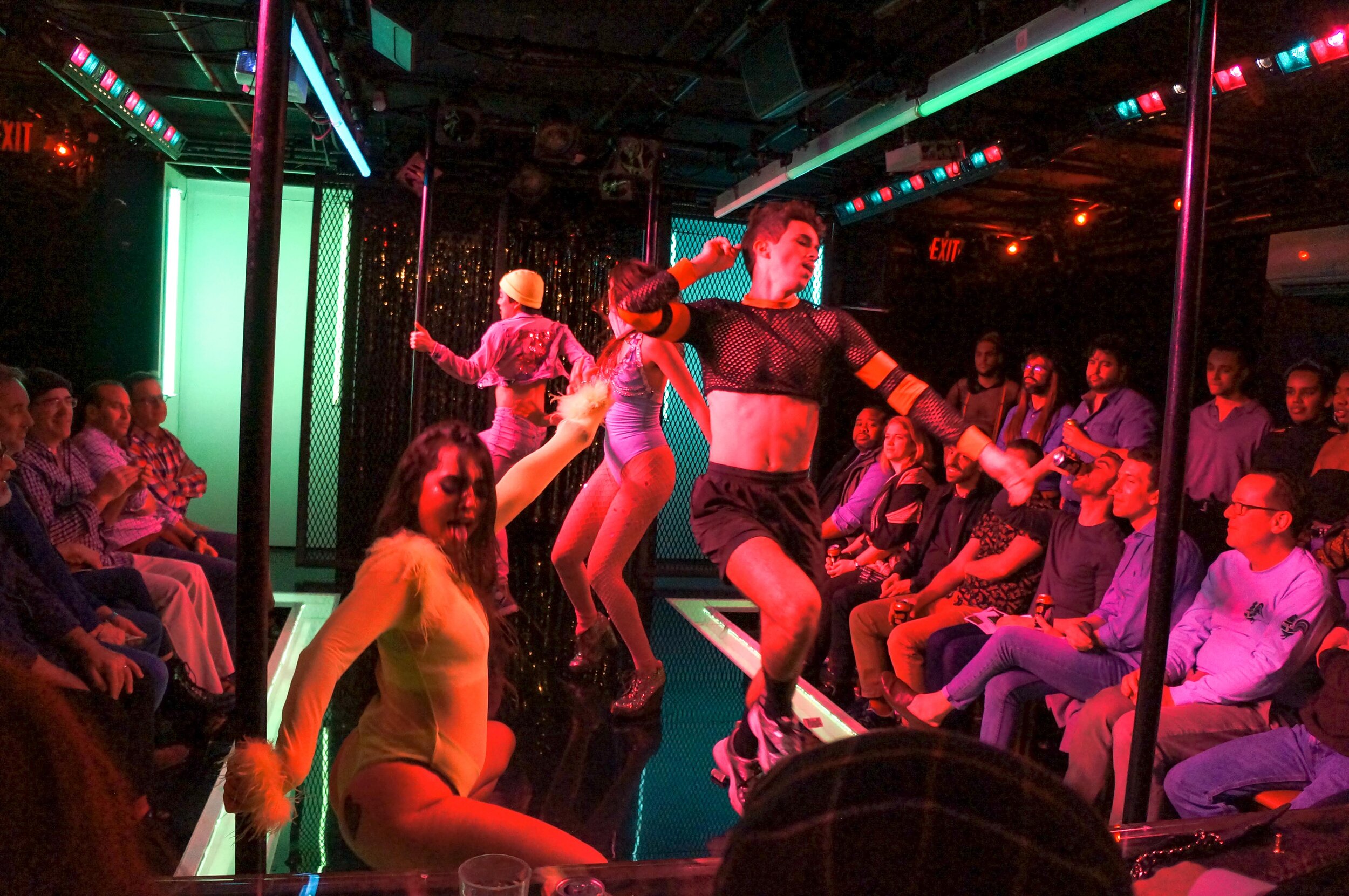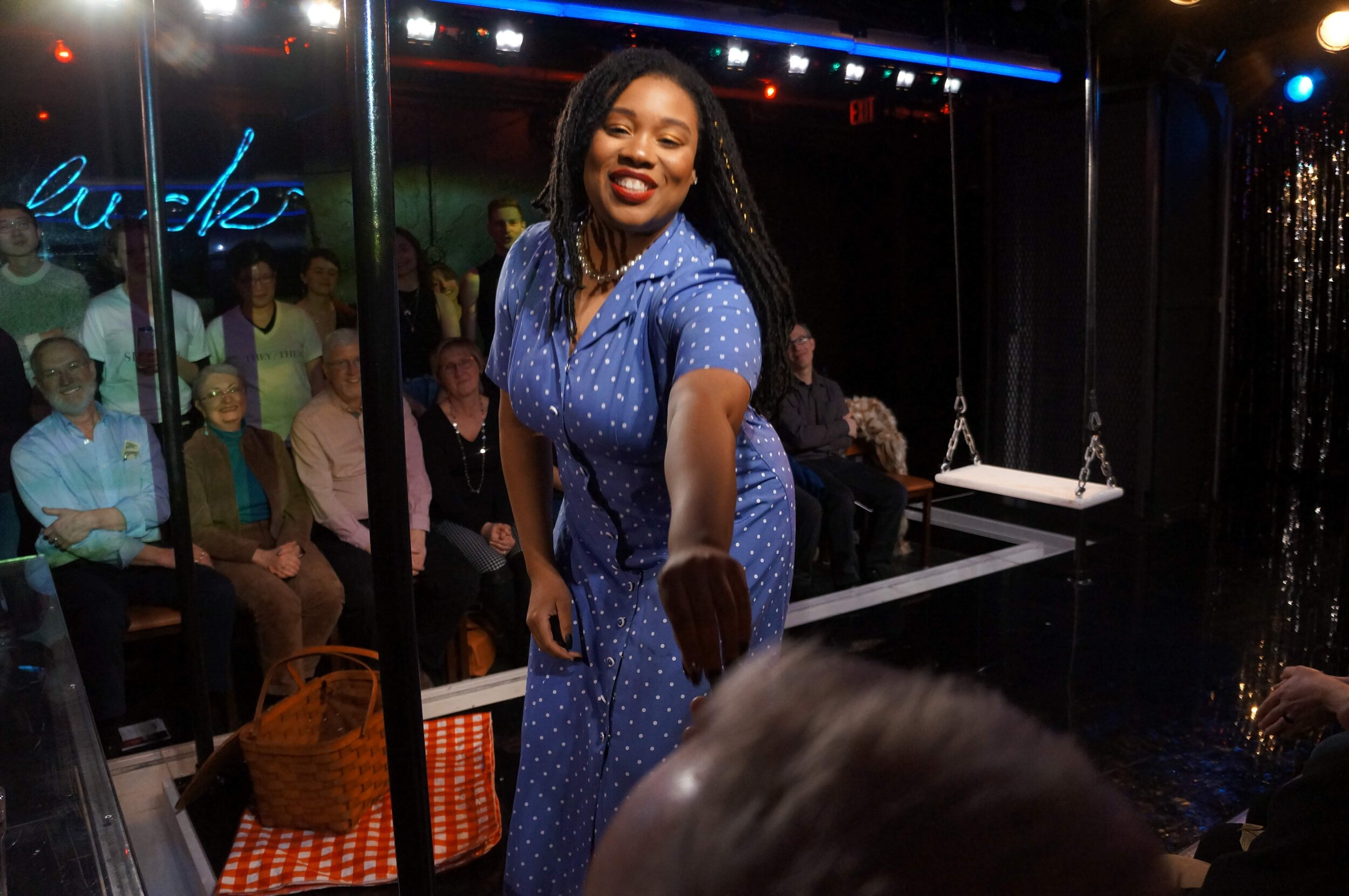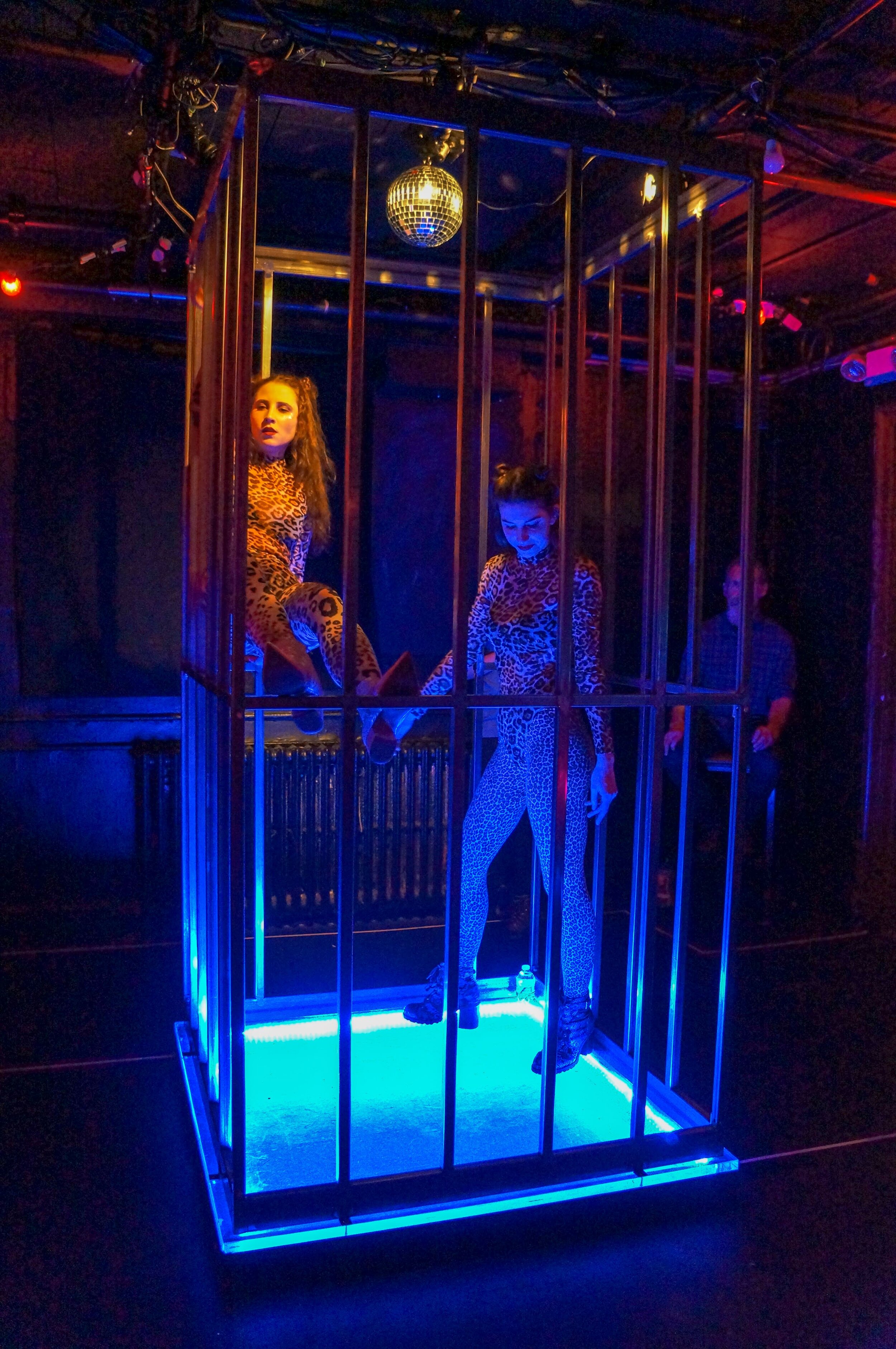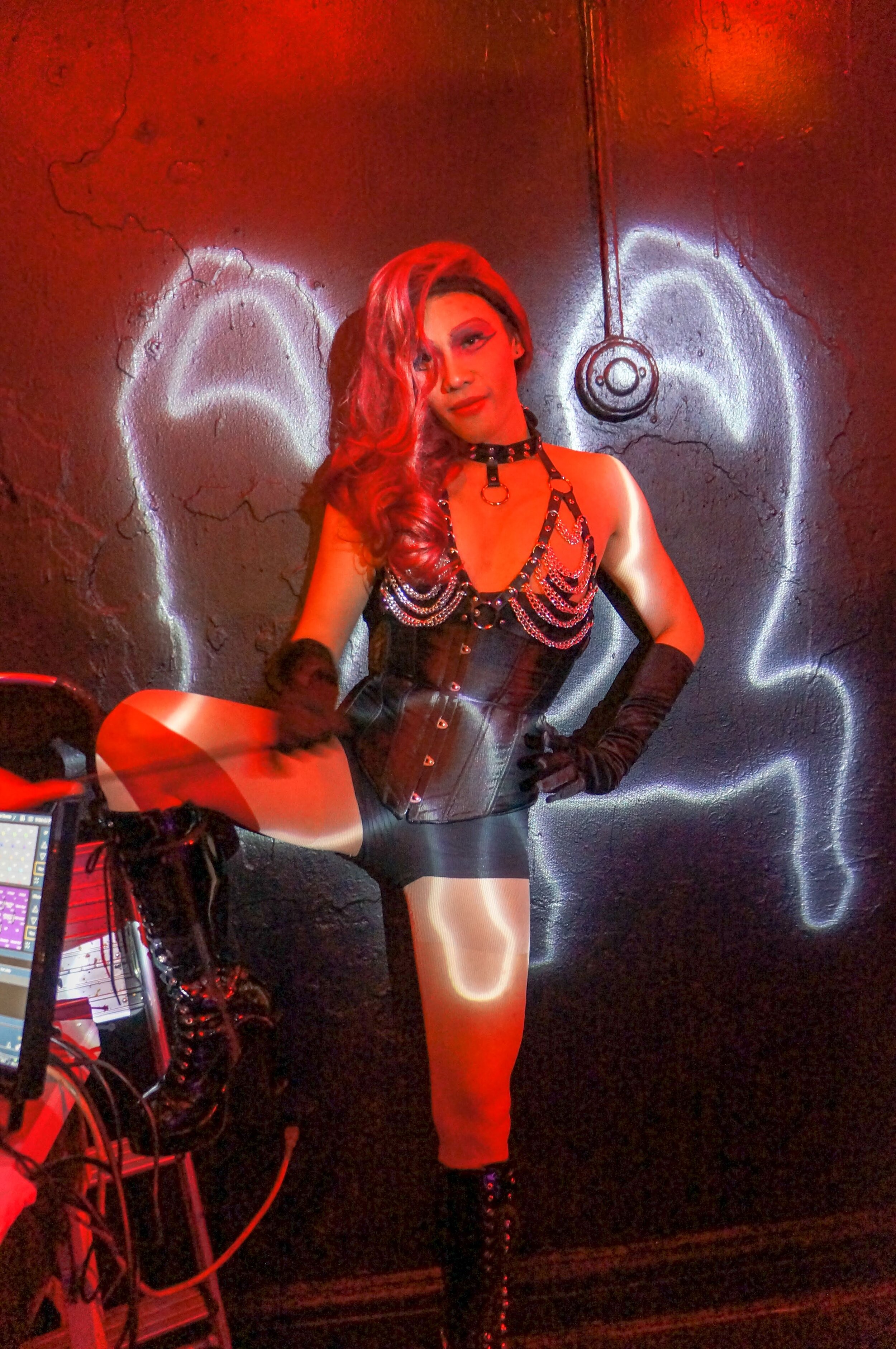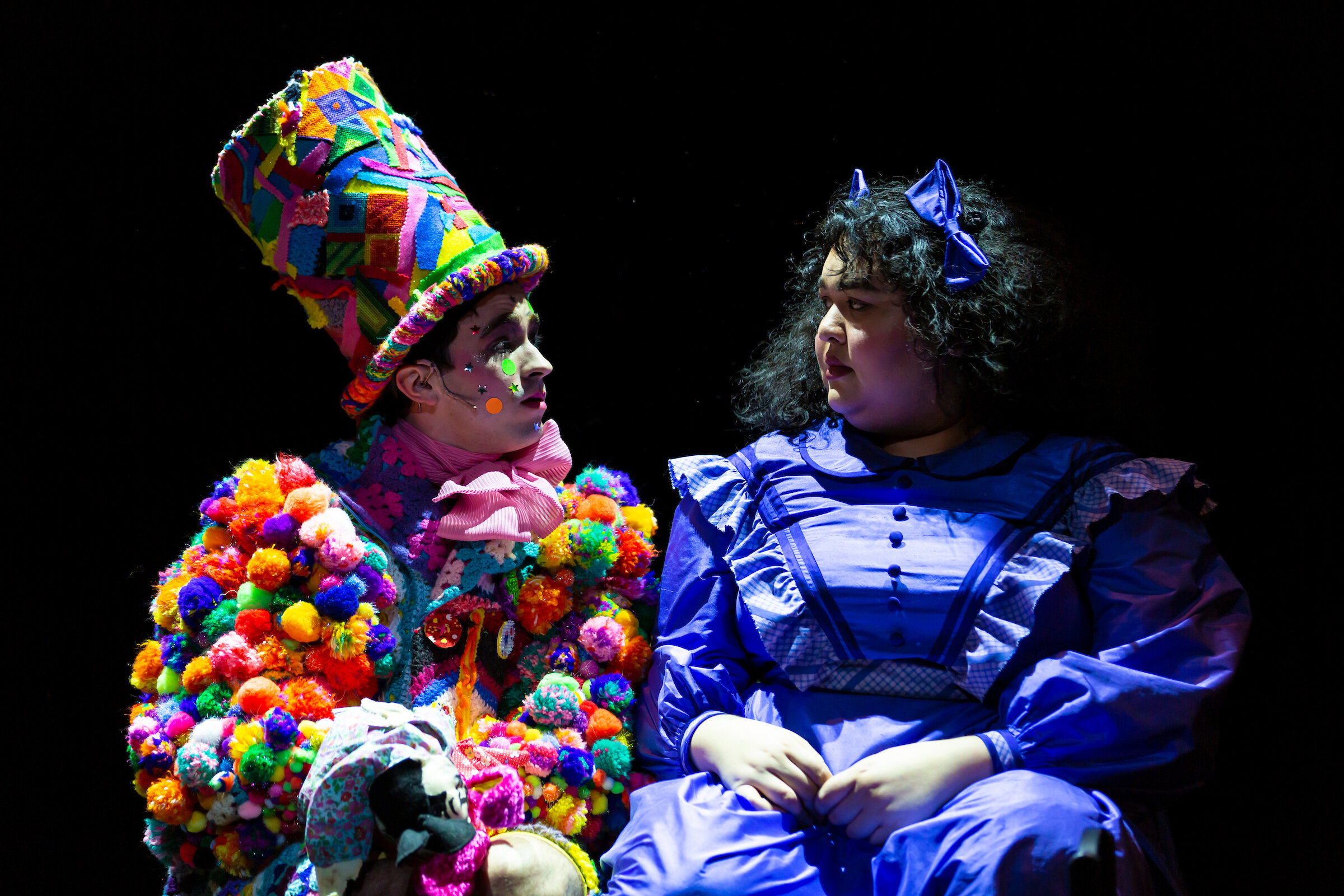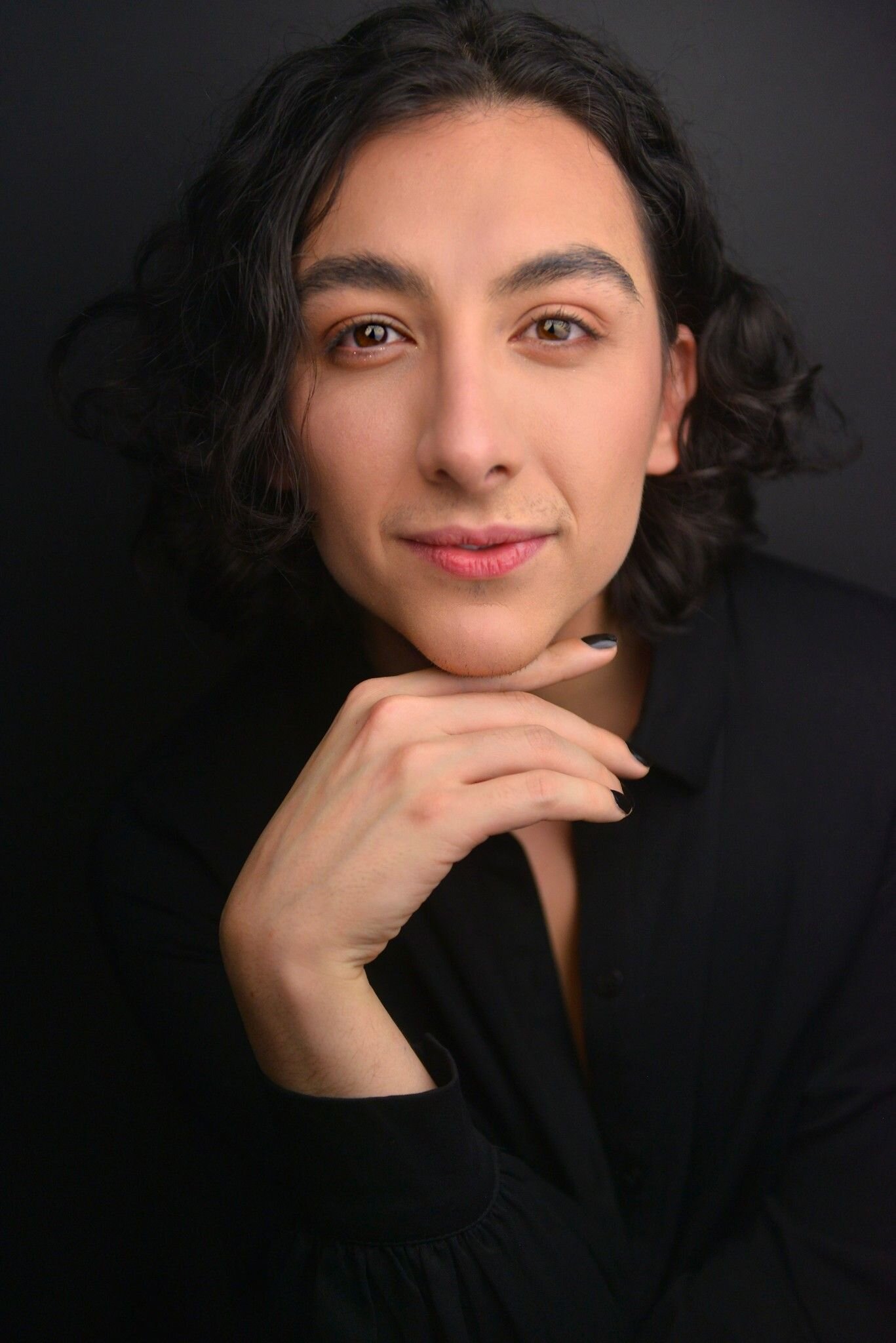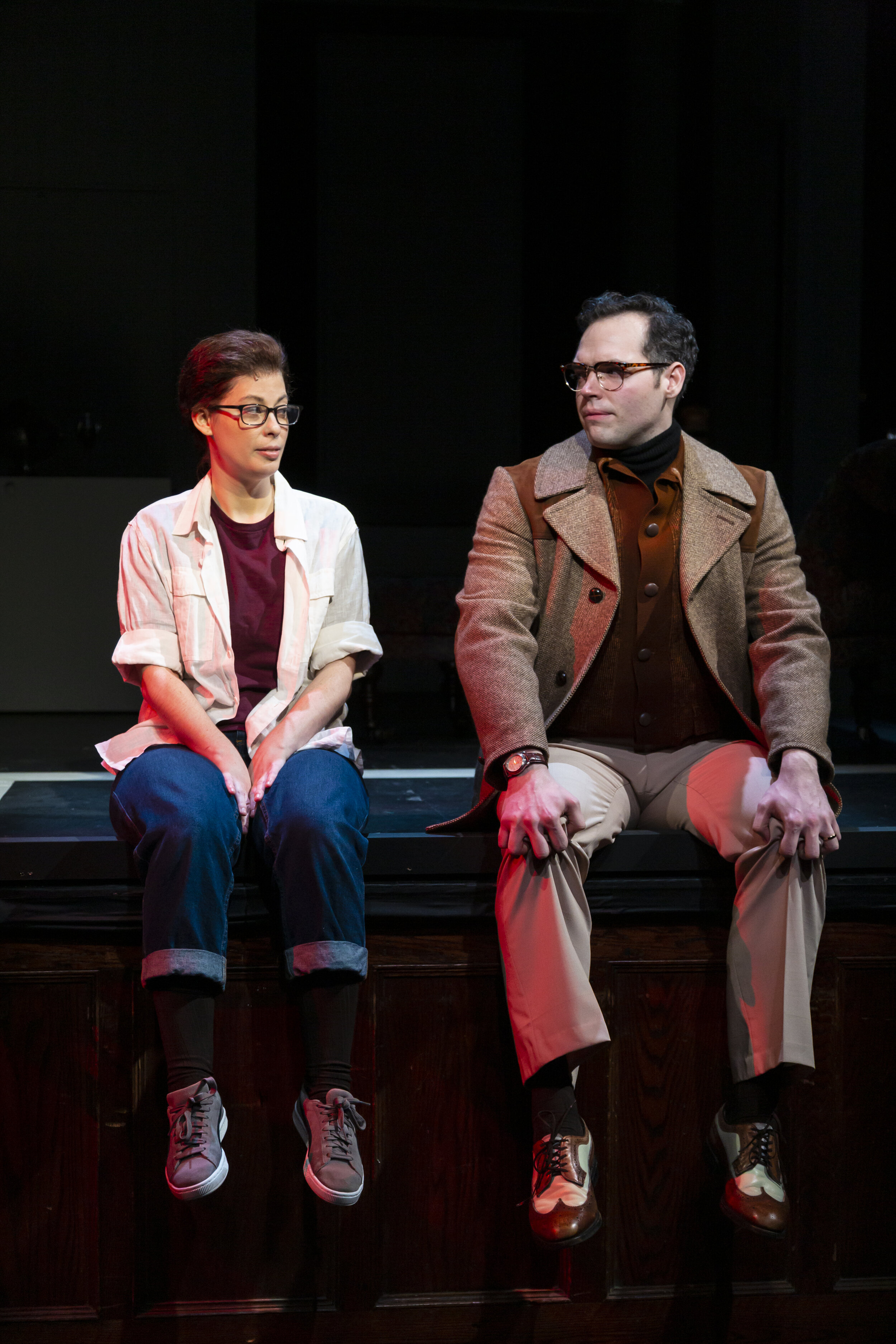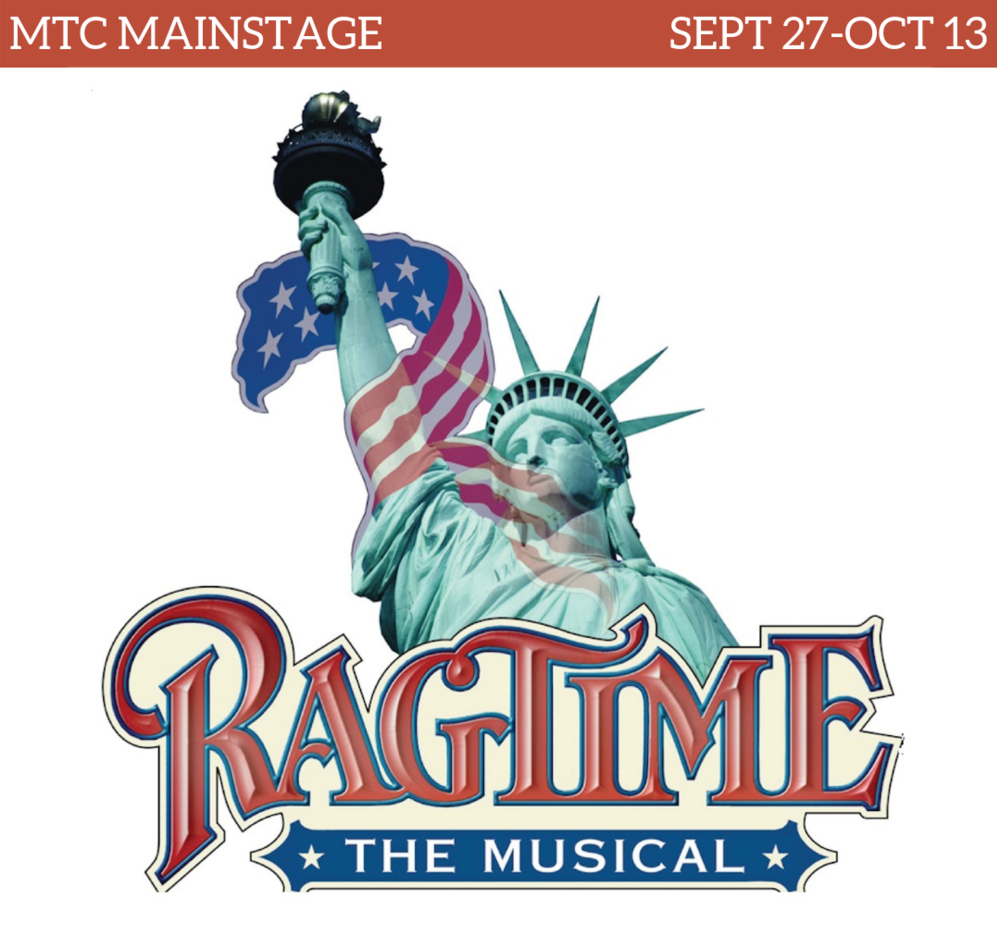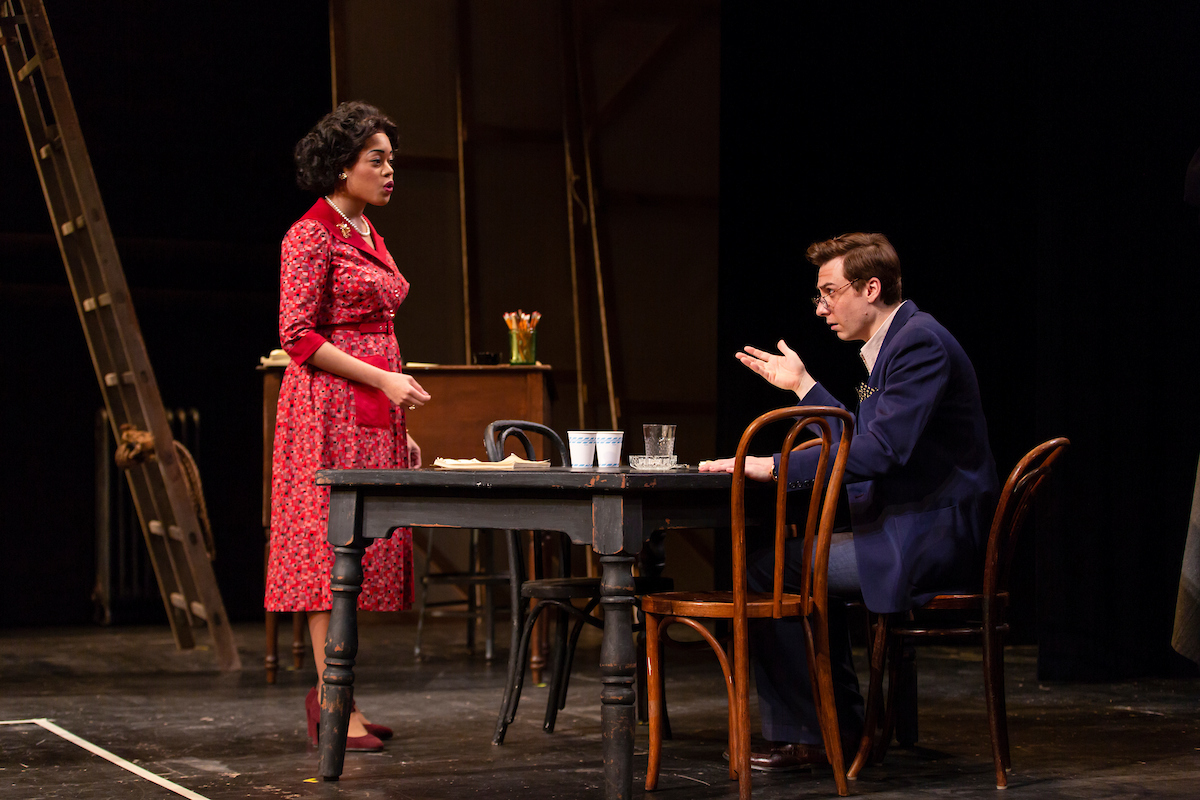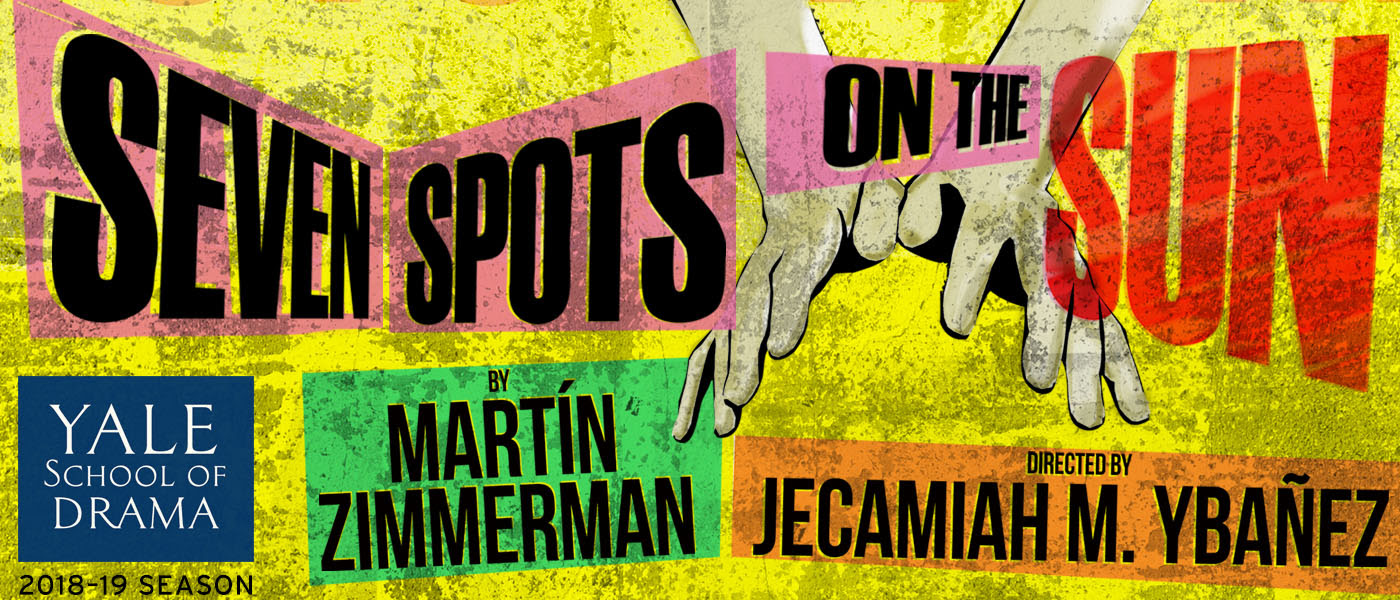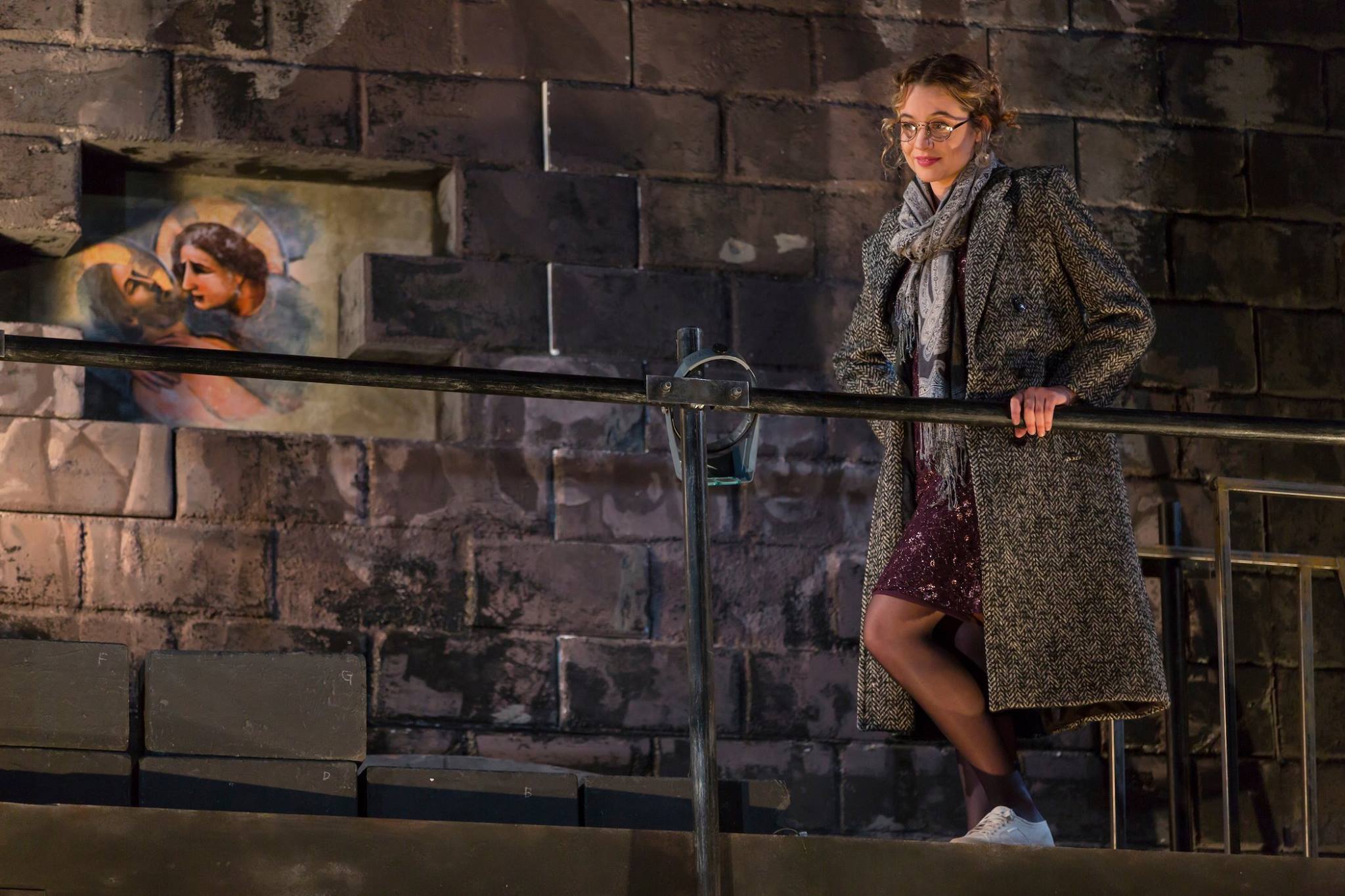Review of Dragaret Underground, Yale Cabaret; with photographs by Linda Young
February and drag go together, if only because, in New Haven, February is often a drag, a month where—as our most recent Nobel laureate puts it—“anyone with any sense had already left town.” But at the Yale Cabaret, February is a drag in quite another sense. It’s the month of Dragaret, an annual celebration of drag performance, as, in the words of co-director (and DJ in Village-People-leather-boy retro) Danilo Gambini, an occasion to “bring joy into the conversation of consent and pleasure.” And that can be worth sticking around for. This year the theme was “underground,” as a place, co-director Alex Vermillion said, “to explore and be safe and sexy.” All are welcome to what should be seen as a “queer utopia.”
Danilo Gambini, Gregory St. Georges
Dragaret is in its eighth year and this is the third year in which Friday night’s two shows, at 8 and 11, were reserved for Connecticut queens while Saturday’s three shows, 8, 10, and midnight, were for students in the Yale School of Drama to perform. Patrick Dunn of New Haven Pride hosted the Friday night shows as Kiki Lucia, Dunn’s drag-queen persona, and David Mitsch, a third-year costume designer in YSD, hosted Saturday’s shows as Tipsy Von Tart.
Tipsy Von Tart
Both nights share great costumes, much lip-synching, surprising moves—artful ways to remove clothing seems de rigueur—and an inspired reach into a grab-bag of cultural references, styles, and personae. The main rule—tip your queens—was enthusiastically adhered to at the shows I attended (Friday, 11 p.m. and Saturday, 10 p.m.) but I have no way of knowing if the show’s mantra—“consent is sexy”—yielded its desired results.
Kiki Lucia
The CT queens of Friday night presented two entirely different shows. The show I saw had a crisp, deliberate professionalism that made for a parade of striking presentations, which included pole-dancing, striptease, and comic or emotional elements. All the performers were memorable in their own ways, but those numbers with a somewhat satiric side—such as Lotus Qween’s hilarious takeoff of Hillary (to the tune of, among other things, “Wedding Bell Blues” with its address to “Bill”) and Laiylah Alf Wa Laiylah’s evocation of Randy Rainbow’s sharp send-up of our national embarrassment, “The Don” (to the tune of “Gaston,” from The Beauty and the Beast)—were favorites for me.
Lotus Qween
Laiylah Alf Wa Laiylah
Other acts were notable for their graceful appearances, such as transgender performer Casey Fitzpatrick, and the moves of Rarity Moonchild, Xiomarie LeBeija, and Sparkle Diamond.
Casey Fitzpatrick
Rarity Moonchild
Xiomarie LeBeija
Sparkle Diamond
Frizzie Borden, billed as a bio-diva, is a woman who does drag as a woman, making a case for how diva-dom can be not only an inspiration but also an oppression. One of the more affecting performances on Friday, for me, was Rory Roux-Lay Heart’s deconstruction of her gorgeous femme persona to the tune of Bowie’s “Is There Life on Mars?”
Frizzie Borden
Rory Roux-Lay Heart
Kiki Lucia closed the show with a driven display to Cher’s “Woman’s World” with couture from The Handmaid’s Tale. A gay man dressed as a woman celebrating the power of women felt entirely appropriate, and if it didn’t, YSD night, when many more women took the stage as bio-divas, opened the question of drag as a way of positioning femininity as a performance art.
Kiki Lucia
The performance of maleness was rather less in evidence, with Jaime Hellfyre (Emma Perundi-Moon), on Saturday night, the only female-as-male performer.
Jaime Hellfyre
On Saturday at 10, our gently ironic hostess Tipsy Von Tart quipped that the jokes had already been said at the 8 p.m., implying that she might get in trouble for going off-script. She interacted with the crowd with perfect aplomb and was a welcome presence between numbers.
Tipsy Von Tart quips with “F. Murray Abraham”
Many of the acts worked as performance art, with the element of drag (however we might define that) of minimal import: JJ McGlone dressed as a solstice maiden in his hysterical evocation of Midsommar;
Midsommar Night’s Scream
The Dollar Bells cavorted in cut-offs and showed-off pole-riding skills because they can;
The Dollar Bells
Zardoz Hologram (Meg Powers) evoked Aladdin-Sane-era Bowie in makeup and her silent cyberbots (Madeline Pages and Bryn Scharenberg), while performing to his “TVC15,” complete with projections upon a TV-prop that eventually, as per the lyrics, consumed her.
Zardoz Hologram
You Can’t Be in the Show (Maia Mihanovich, Jackeline Torres Cortes, Daniel Liu, Julian Sanchez) mystified me with the import of their performance but it ended with what seemed an entirely consensual orgiastic oneness.
You Can’t Be in the Show
Stripping off a costume to reveal a decidedly different subtext was the order of the evening for many routines: Prettiest Little Devil (Zak Rosen), the only undergraduate performer, sported red wings under his gown;
Prettiest Little Devil
Georgia O’Queef (Alexandra Maurice) opened her number as a demure lady complete with picnic basket, mouthing a ‘60s torch song, only to transform before our eyes into a bumping-and-grinding diva;
Georgia O’Queef
Lady Lilith (Alex Vermillion) began zir piece as a distressed princess desperately beseeching a bald, bespectacled Dean (Matthias Neckermann) for an MFA, only to strip off all pretense at supplication in order to spank the abased academician on his leather-clad bundy, er, booty;
Lady Lilith and Dean
and Cerebral Pussy (Jessy Yates) came forward as a devotee of Jesus in a wheelchair who, filled with grace or something more carnal, took off her clothes and danced.
Cerebral Pussy
Two routines that earn special mention: the somber and studied manner in which Shabbos Queen (Adam Shaukat) put on clothes to become herself;
Shabbos Queen
and the ladies of El Cibao (Ilia Isorelýs Paulino, Nurilys Cintron, Noemi Paulino, Nefesh Cordero Pino, Jackeline Torres Cortes, Maia Mihanovich, Tyler Cruz) who performed in two different patterns of rhythmic unison and ended by waving flags of different countries.
El Cibao
Finally, our gracious hostess, Tipsy, ended the evening with a rousing performance recalling one of the greatest of all drama queens, Blanche Dubois, who seemed only too glad to depend upon the kindness of a hirsute stranger—an embodiment of the male principle as a rather randy bear (Brandon E. Burton).
Tipsy Von Tart and friend
Credit and accolades to Jimmy Stubbs who designed an impressive catwalk with wings as well as a cage for terpsichorean celebrants; Liam Bellman-Sharpe for sound; Emma Deane and Nicole E. Lang for lights; Hannah Tran for projections, and Kitty Cassetti and Aiden Griffiths for costumes that inspired—and at times left nothing to—the imagination.
Doireann Mac Mahon, Sarah Karl
For the midnight show other acts were added, but this ends my account of Dragaret 02/20. The Yale Cabaret has our permission to do it to us again next year…
Riw Rakkulchon (YSD MFA *19)
Dragaret Underground
Co-directed by Danilo Gambini and Alex Vermillion
Co-Producers: Sarah Cain and Jason Gray; Set Designer: Jimmy Stubbs; Co-Lighting Designers: Emma Deane and Nicole E. Lang; Projection Designers: Hannah Tran; Co-Costume Designers: Kitty Cassetti and Aiden Griffiths; Sound Designer: Liam Bellman-Sharpe; DJ: Danilo Gambini; Dramaturg: Madeline Pages; Technical Director: Libby Stone; Assistant Technical Directors: Doug Kester and Kat McCarthey; Stage Manager: Sam Tirrell; Assistant Stage Managers: Julia Bates and Edmond O’Neal
Hosts: Kiki Lucia, Feb. 21; Tipsy Von Tart, Feb. 22
Performers, Feb. 21: Kiki Lucia, Casey Fitzpatrick, Lotus Qween, Rarity Moonchild, Frizzie Borden, Xiomarie LaBeija, Sparkle Diamond, Laiylah Alf Wa Laiylah, Rory Roux-Lay Heart
Performers, Feb. 22: Christopher D. Betts, Brandon E. Burton, Estefani Castro, Nurilys Cintron, Jackeline Torres Cortes, Tyler Cruz, Danilo Gambini, Sarah Karl, Daniel Liu, Sarah Lyddan, Doireann Mac Mahon, Juliana Martinez, Alexandra Maurice, JJ McGlone, Alex McNamara, Maia Mihanovich, David Mitsch, Ciara Monique, Matthias Neckermann, Reed Northrup, Madeline Pages, Eli Pauley, Ilia Isorelýs Paulino, Noemi Paulino, Emma Pernudi-Moon, Nefesh Cordero Pino, Meg Powers, Zak Rosen, Julian Sanchez, Bryn Scharenberg, Adam Shaukat, Alex Vermillion, Adrienne Wells, Maal Imani West, Devin White, Jessy Yates
Yale Cabaret
February 21-22, 2020
